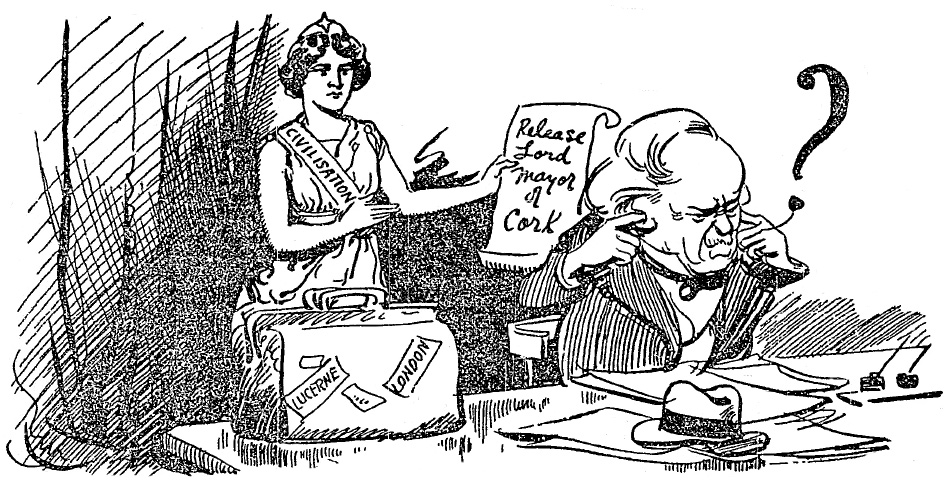MacSwiney reaches 40th day on hunger strike and issues message to the world
‘We forgive all those who are compassing our death’, says MacSwiney
Brixton, 21 September 1920 - The Lord Mayor of Cork, Terence MacSwiney has issued what some are calling a ‘dying message’ to ‘Irish People Throughout the World’.
In the statement, released on 19 September, MacSwiney expressed gratitude on his own behalf and on behalf of his fellow prisoners in Cork Gaol for the wonderful support they have received and for the masses and prayers that have been offered up for them. ‘The spiritual assistance afforded us has, I believe, sustained us in a supernatural manner... No natural reason can explain to me why I am, myself, alive. I was brought here after five days’ fast and a 24 hours’ journey in such a state of collapse that it was impossible to forcibly feed me.’

Left: Guinness workers leaving St James's Church after a mass for the Cork Lord Mayor. Right: procession of hotel workers on the way to the Pro-Cathedral (Images: Freeman's Journal, 10 Sept 1920 and 14 Sept 1920)
The Lord Mayor attributes his perseverance to the daily communion that brings him ‘bodily strength’, as well as to the masses and prayers offered for him all over the world. MacSwiney says that he believes that God has intervened for ‘our enemy’s sake… giving them a last chance to pause and consider’ before allowing this ‘callous and cold-blooded murder’ to be pushed to is end.
MacSwiney’s statement continued that he and his comrades were ‘singularly privileged in being made the instruments of God for evoking such a world-wide expression of admiration and support for the cause of Irish independence and the recognition of the Irish republic, and if we are to die we are called to even the greater privilege and happiness of entering the devoted company of those who died for Ireland.’
‘We forgive all those who are compassing our death. This battle is being fought with a clean heart purely for our country. We have made our peace with God, and bear ill will to no man.’
Press reaction
Reacting to what it has described as a ‘remarkable’
message, the Westminster Gazette says that it brings home
how ‘utterly the government misconceives the real
issues’ in MacSwiney’s case.
The Evening Standard has suggested that after today, as his hunger strike passes 40 days and 40 nights – a period closely associated with his religious beliefs – there may be an attempt on the part of his friends to get him to break his fast on spiritual grounds.
The French press, which has shown tremendous and sustained interest in MacSwiney’s plight, does not share this view. The London representative of Le Petit Parisien has written that the publication of the letter is ‘considered an indication that a fatal issue is approaching’ and if MacSwiney dies, the British government will find itself in a difficult situation.
[Editor's note: This is an article from Century Ireland, a fortnightly online newspaper, written from the perspective of a journalist 100 years ago, based on news reports of the time.]





















